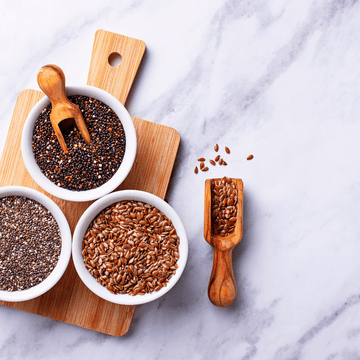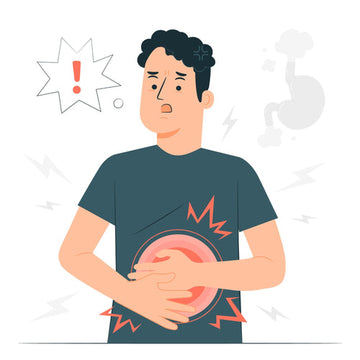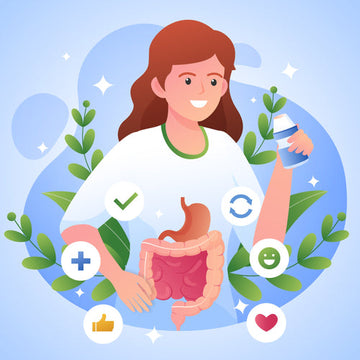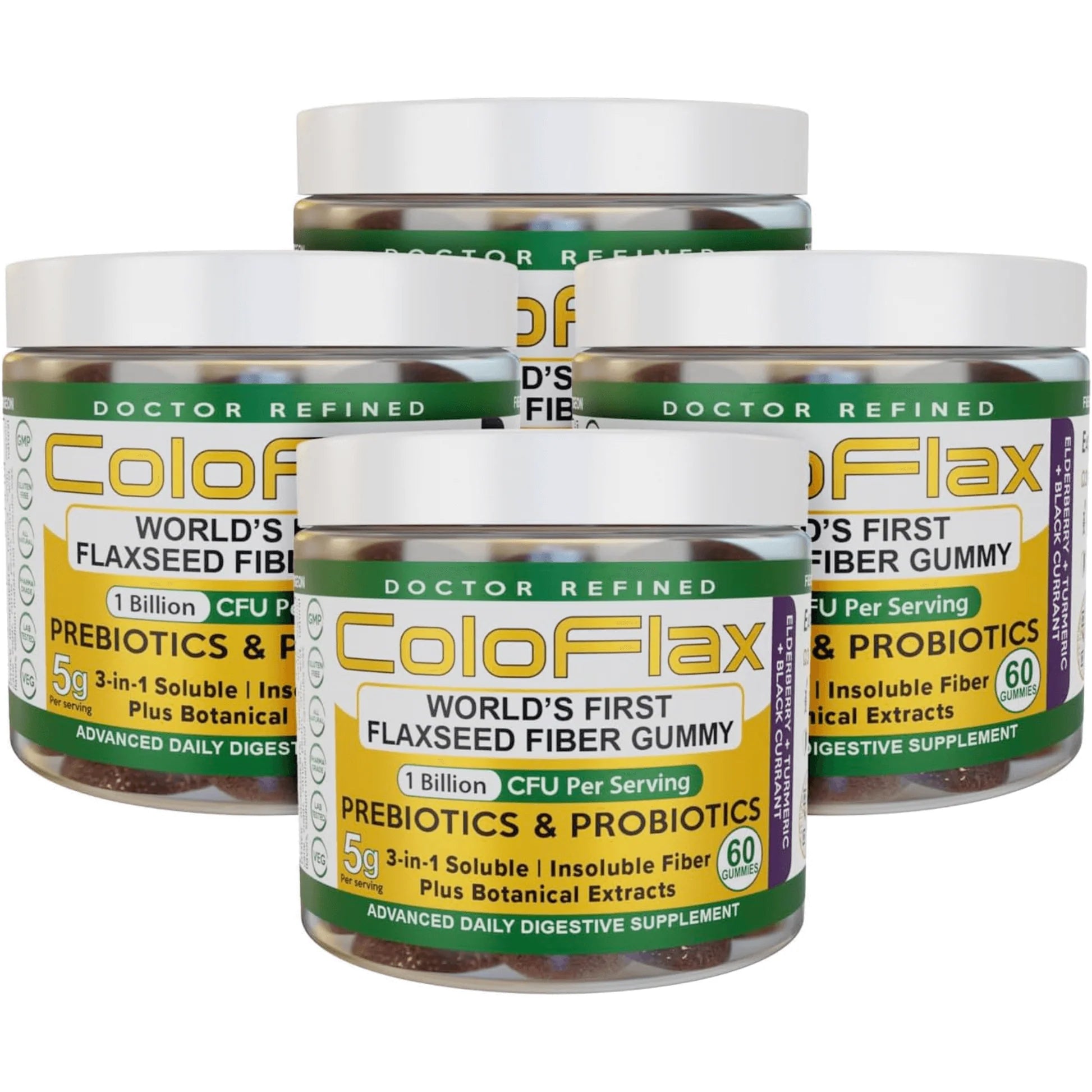Flaxseed is incredible. So good, in fact, that we included it in our fiber-full, health-boosting supplement and even borrowed its name. But what makes it so special, what does it contain, and what can it do for you?
Let’s find out.
What is Flaxseed?
Before we take a deep dive into flaxseed and its many benefits, it’s worth looking at what flaxseed actually is.
In simple terms, flaxseeds are the seeds of the flax plant. They have been cultivated, consumed, used, and prized for thousands of years. The fiber of the flax plant gives us linen, the oil gives us linseed oil (flaxseeds are also known as “linseeds”), and the seeds are a rich source of fats, nutrients, and protein.
The Latin word for flax is “Linum usitatissimum”, with “usitatissimum” used as a superlative of “useful”. In other words, the Romans were so fond of this plant they named it “very useful”. (1)(2)
Flaxseed for Overall Health
If we told you there was a meal that provided 18g of protein, 27g of fiber, 22g of omega-3s, and over 20% DV of Magnesium, Phosphorus, Zinc, B1, B3, B5, B6, Iron, Calcium, Copper, Manganese, Selenium, and Folate, you’d probably expect some kind of superfood salad.(3)
A little lean meat, a lot of leafy greens, some tomatoes, seeds, nuts, and maybe a sprinkle or two of a superfood mix.
Right?
Not quite, as that nutritional profile comes from just 100g (3.5 oz) of flaxseeds. In exchange for those nutrients, you’ll be consuming just over 500 calories, which equates to between a quarter and a fifth of your recommended daily caloric intake. It also has fewer calories than a Big Mac, and yet contains far more nutrients.
Of course, we don’t expect you to chomp down on nearly a cup of seeds, but it gives you an idea of just how potent these little seeds are.
Adding just a couple of tablespoons of flaxseed to the odd smoothie, shake, or salad could greatly boost your micronutrient content for the day.
Flaxseeds are also high in antioxidants, compounds that eliminate cancer-causing free radicals from your body. It’s like a powdered multivitamin, only delicious, and you know that you’re getting all of those nutrients in their natural form.
Flaxseed is cheap, widely available, and tastes great. It’s also very versatile, as you can add these seeds to savory foods and sweet foods. And if you want something quicker and easier, you can pick up a bottle of flaxseed oil or try a flaxseed supplement like ColoFlax.
Flaxseed for Constipation
Flaxseed is great for keeping you regular and promoting optimal digestive health. A single tablespoon will give you nearly 2 grams of fiber, and adding a couple of these to your breakfast cereal or evening salad will greatly help toward your recommended daily intake.
But the benefits of flaxseeds extend beyond the number shown on a label. The quality of the fiber is just as important, as flaxseeds contain both soluble and insoluble fiber.
Soluble fiber dissolves in water and helps to form bulky stools; insoluble fiber doesn’t dissolve and is added to these stools as they move through the digestive tract. It’s important to have a balance of both fiber types, and flaxseeds help with that.
Flaxseed for Digestive Health
Not only can regular flaxseed consumption help with constipation, but it can also reduce the risk of diverticular disease, hemorrhoids, and colorectal cancer. You’ll feel better too, as nothing slows you down like a sluggish gut and regular bouts of constipation.(4)
Think about the last time you were constipated. Did you feel like your usual self or did you feel tired, frustrated, and irritable? Probably the latter, and you’re not alone. Chronic constipation, flatulence, and bloating have a way of leeching into every other part of our lives and affecting our energy levels, mood, and even our sleeping patterns.
To maximize the benefits of flaxseed consumption, make sure you drink plenty of water, stay active, and consume other types of fiber.
Flaxseed as a Vegan-Friendly Source of Omega-3s
We’ve all been informed of the benefits of omega-3 fatty acids. They have been praised as the ultimate panacea by some, with links to everything from improved cognition and joint health to reduced cancer risk and more.
Some of the benefits of omega-3s are poorly understood and others need more research, but what we can say for sure is that they are good for you, they are safe, and you probably need more of them.
If you don’t eat fish, these benefits might seem out of reach, as omega-3s are at their most abundant in oily fish. But flaxseeds are an incredible source of omega-3s and they are 100% vegan-friendly.
Flaxseed and flaxseed oil contain a fatty acid known as alpha-linoleic acid (ALA). The recommended ALA consumption for men is 1.6g a day and for women, it’s 1.1g. A single tablespoon of flaxseeds contains around 2.3g while flaxseed oil has over 7g.
Like all seeds, flaxseeds contain a lot of fat, but most of it is monounsaturated and polyunsaturated, so it’s good for you. Regular consumption of these “healthy fats”, in combination with low amounts of saturated fat, has been linked to a host of cardiovascular benefits. (5)
Flaxseed for Lignan Consumption
If you look at your ColoFlax label, you’ll notice something called “lignan-rich flaxseed”. By now, you should have a pretty good idea of what flaxseed is, but what about lignans?
Lignans are plant compounds found in a number of foods (including sesame seeds, sunflower seeds, berries, wheat, bran, oats, and pumpkin seeds), but flaxseeds have by far the highest concentration. In fact, there are over 75 times more lignans in flaxseeds than other common sources.(6)
These compounds have been linked with some amazing benefits and have shown incredible results in the lab and in animal studies.
More studies need to be conducted before we can label lignans as preventative or curative, but current research is certainly very promising.
Flaxseed for High Blood Sugar
A 2018 meta-analysis found flaxseed supplementation to be helpful in the treatment of high blood sugar, with the study finding, “a significant association between flaxseed supplementation and a reduction in blood glucose”.(7)
These effects were only noted following the consumption of whole flaxseed and weren’t reproduced with flaxseed oil and lignan extract. As a result, it’s fair to assume that these benefits stem from flaxseed’s high fiber content.
Not only can a high-fiber diet improve your digestive health, but it can also work wonders for your blood sugar. It slows the passage of waste through your colon, thus reducing the rate at which sugars are absorbed into the blood.
Flaxseed is a natural treatment for high blood sugar, so there are no side effects or risks and it can be used in combination with other treatment methods.
Flaxseed Could Help with Weight Loss
A high-fiber diet could help with weight management. It reduces cravings for high-sugar, high-fat foods by slowing down the digestive process, thus making you feel fuller for longer.
A meta-analysis conducted in 2017 looked at 45 randomized placebo-controlled trials and found that consumption of flaxseed was inversely associated with weight gain. In other words, adding flaxseeds or a flaxseed supplement to the participant’s diet led to noticeable weight loss.(8)
This is great news if you find that you’re a slave to your cravings and simply can’t resist junk food and sugar-laden desserts when you’re on a diet.
It’s not a magic bullet, and you still need to drink plenty of water, eat a whole food diet, and exercise frequently, but a little flaxseed can clearly go a very long way.
Flaxseed Could Reduce Blood Pressure and Lower Cholesterol
Flaxseed consumption has a notable effect on systolic and diastolic blood pressure, with multiple studies finding that regular consumption can reduce both of these numbers.
One of the most interesting of these studies looked at 112 patients between the ages of 35 and 70. They were split into two groups, with one given a placebo and the other either 10g or 30g of flaxseed.(9)
Both of the flaxseed groups experienced a drop in their blood pressure readings while the placebo group increased.
Interestingly, this study also checked cholesterol levels and noted a drop of 20.4 units, compared to just 11.86 from the placebo group. They also found that the 30g flaxseed group experienced far more benefits than those taking 10g.
As with the weight loss and blood sugar benefits, this probably has a lot to do with the high fiber content and the speed at which it moves through the gut. The lignans and antioxidants could also play a role.
The Benefits of Flaxseed Hair Oil and Skin Oil
Last but not least, there’s one often overlooked benefit that deserves a mention, and it concerns what flaxseed can do for your hair. Flaxseed oil has been used in haircare products owing to its high lignan and vitamin E content.
It has been suggested that these compounds help to stimulate hair growth and protect against hair loss. The nourishing effects of vitamin E could also promote optimal scalp health and prevent dryness and dandruff.
Flaxseeds are skin-safe, so flaxseed oil can also be applied directly to the skin. Vitamin E is known to provide many protective and curative properties when used topically, and the antioxidant content could protect against sun and environmental damage. It has also been said that a little flaxseed oil can lessen the appearance of fine lines and wrinkles.
Summary: The Many Uses and Benefits of Flaxseeds
The flax plant has played an essential role in human history. Flax was being spun into linen as early as 30,000 years ago. The Sumerians created expensive clothing from it. The Egyptians used it to wrap their mummies. The Romans used it for their sails. And from the early civilizations of the fertile crescent through to the modern ages, the seeds of this amazing plant have been used as food and medicine.(10)
There are few foodstuffs that can rival flaxseeds for combined fiber, fat, and protein content, and that’s before you consider the many vitamins, minerals, and antioxidants.
So, the next time you pick up some flaxseeds at the grocery store, remember the amazing journey that these little superfoods have taken.
References
- https://agris.fao.org/agris-search/search.do?recordID=DE97R2662
- https://fdc.nal.usda.gov/fdc-app.html#/food-details/169414/nutrients
- https://www.ncbi.nlm.nih.gov/books/NBK559033/
- https://ods.od.nih.gov/factsheets/Omega3FattyAcids-HealthProfessional/
- https://www.ncbi.nlm.nih.gov/pmc/articles/PMC4375225/
- https://pubmed.ncbi.nlm.nih.gov/29869224/
- https://pubmed.ncbi.nlm.nih.gov/29228348/
- https://pubmed.ncbi.nlm.nih.gov/28635182/
- https://pubmed.ncbi.nlm.nih.gov/34119421/
- https://www.npr.org/2009/09/10/112726804/these-vintage-threads-are-30-000-years-old






